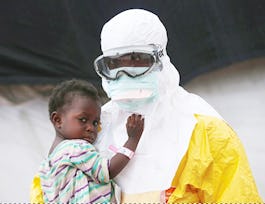This course provides students an understanding of important human parasitic diseases, including their life cycles, vectors of transmission, distribution and epidemiology, pathophysiology and clinical manifestations, treatment, and prevention and control. Tropical Parasitology is taught by faculty from an area highly impacted by tropical parasites- the Kilimanjaro Christian Medical University College in Moshi, Tanzania. The faculty include Drs. Frank Mosha and Mramba Nyindo (and two lecturers, Drs. Johnson Matowo and Jovin Kitau). Dr. John Bartlett, Professor of Medicine, Global Health and Nursing at Duke University, joins his faculty colleagues in this effort.



Tropical Parasitology: Protozoans, Worms, Vectors and Human Diseases



Instructors: John A. Bartlett, M.D.
29,550 already enrolled
Included with
(652 reviews)
Skills you'll gain
Details to know

Add to your LinkedIn profile
19 assignments
See how employees at top companies are mastering in-demand skills


Earn a career certificate
Add this credential to your LinkedIn profile, resume, or CV
Share it on social media and in your performance review

There are 9 modules in this course
Welcome to Tropical Parasitology: Protozoans, Worms, Vectors, and Human Diseases! In this course, students will develop an understanding of important human parasitic diseases, including their life cycles, vectors of transmission, distribution and epidemiology, pathophysiology and clinical manifestations, treatment, and prevention and control. Tropical Parasitology is taught by Kilimanjaro Christian Medical University College faculty -- Drs. Frank Mosha and Mramba Nyindo (and two lecturers, Drs. Johnson Matowo and Jovin Kitau). They are joined by Dr. John Bartlett, Professor of Medicine, Global Health and Nursing at Duke University. To get started, view the video "Welcome to Tropical Parasitology," read the Course Overview, read about how the course is structured in Course Clusters, and review the Course Resources. Then move on to study the first cluster, Protozoans. Please note that the Protozoans cluster constitutes the largest content cluster in the course, and we have allocated 3 weeks to complete the work for this cluster. The other course clusters will take one week (each) to complete. We hope you enjoy the course, and we look forward to your contributions to our learning community.
What's included
1 video2 readings
We are excited to begin our Protozoa cluster, focusing on malaria, trypanosomiasis, toxoplasmosis, and leishmaniasis. Despite advances in prevention and treatment, protozoal diseases contribute substantially to the global burden of morbidity and mortality. This cluster has a total of 153 minutes of video and 85 pages of reading spread out over the four lessons. Each lesson has all of the readings, lectures, and additional materials to help you understand the topic. You will have unlimited opportunities to take an untimed quiz after you’ve mastered the material in each lesson, and you have four quizzes to complete in this cluster. (Note: this cluster includes a case study practice quiz, ungraded, which is optional). This cluster kicks off with a close look at malaria vectors and the fascinating research being done on diagnosing, treating, and vaccinating against malaria. This is by far the largest cluster in the course, so you have up to 3 weeks to complete this cluster.
What's included
11 videos1 reading3 assignments
What's included
6 videos1 reading1 assignment
What's included
6 videos2 readings3 assignments
The Cestodes cluster focuses on taeniasis and echinococcosis. One example of their impact is neurocysticercosis, which is estimated as the leading cause of epilepsy in low- and middle-income countries. This cluster has a total of 41 minutes of video and 31 pages of reading spread out over two lessons. You will have unlimited opportunities to take an untimed quiz after you’ve mastered the material, and you have two quizzes to complete for this cluster. This cluster begins by looking at the acquisition, manifestation, diagnosis, and treatment of neurocysticercosis, a helminthic infection of the nervous system caused by Taenia solium.
What's included
9 videos2 readings2 assignments
The Trematodes cluster focuses on schistosomiasis and fascioliasis. It is estimated that almost 60 million people are infested with trematodes globally. This cluster has a total of 79 minutes of video and 31 pages of reading spread out over the two lessons. You will have unlimited opportunities to take an untimed quiz after you’ve mastered the material in each lesson, and you have two quizzes to complete for this cluster. This cluster begins by looking at schistosomiasis, a common intravascular infection caused by parasitic trematode worms in contaminated water.
What's included
11 videos2 readings2 assignments
The Nematodes cluster focuses on filariasis, ascariasis, hookworm, and strongyloidiasis. Nematode infestations may impact up to 185 million people in recent estimates of the global burden of disease. This cluster has a total of 90 minutes of video and 8 pages of reading spread out over four lessons. You will have unlimited opportunities to take an untimed quiz after you’ve mastered the material in each lesson, and you have four quizzes to complete for this cluster. This cluster kicks off by examining lymphatic filariasis and the fundamental need for compassion as a core value in global health practice.
What's included
15 videos4 readings4 assignments
We are now into our final cluster, Ectoparasites, focusing on fleas, ticks and mites, lice, and pathophysiology of infestation with ectoparasites. In addition to causing annoying symptoms on their own, ectoparasites may be important vectors of human disease. This cluster only contains one lesson (Ectoparasites) and has 30 minutes of video and 33 pages of reading. You will have unlimited opportunities to take an untimed quiz after you’ve mastered the material, and you have one quiz to complete for this cluster We begin by looking at how to prevent Lyme disease through protective measures, tick reduction, and various vaccines for humans, ticks, and even reservoirs.
What's included
4 videos1 reading1 assignment
The final exam is a graded 3-part exam, and each part includes information from all of the disease clusters covered throughout the course. The final exam consists of 45 questions, in total. You will have unlimited attempts for each part of the final exam, with the highest scoring attempt counting toward the course grade. The final exam will contribute 60% to your total course grade (with each part of the exam having a weight of 20%).
What's included
3 assignments
Instructors



Recommended if you're interested in Basic Science

University of Colorado Boulder

Johns Hopkins University

University of Amsterdam
Why people choose Coursera for their career




Learner reviews
Showing 3 of 652
652 reviews
- 5 stars
78.68%
- 4 stars
15.33%
- 3 stars
3.68%
- 2 stars
1.22%
- 1 star
1.07%
New to Basic Science? Start here.

Open new doors with Coursera Plus
Unlimited access to 7,000+ world-class courses, hands-on projects, and job-ready certificate programs - all included in your subscription
Advance your career with an online degree
Earn a degree from world-class universities - 100% online
Join over 3,400 global companies that choose Coursera for Business
Upskill your employees to excel in the digital economy
Frequently asked questions
No. Completion of a Coursera course does not earn you academic credit from Duke; therefore, Duke is not able to provide you with a university transcript. However, your electronic Certificate will be added to your Accomplishments page - from there, you can print your Certificate or add it to your LinkedIn profile.
Access to lectures and assignments depends on your type of enrollment. If you take a course in audit mode, you will be able to see most course materials for free. To access graded assignments and to earn a Certificate, you will need to purchase the Certificate experience, during or after your audit. If you don't see the audit option:
The course may not offer an audit option. You can try a Free Trial instead, or apply for Financial Aid.
The course may offer 'Full Course, No Certificate' instead. This option lets you see all course materials, submit required assessments, and get a final grade. This also means that you will not be able to purchase a Certificate experience.
When you purchase a Certificate you get access to all course materials, including graded assignments. Upon completing the course, your electronic Certificate will be added to your Accomplishments page - from there, you can print your Certificate or add it to your LinkedIn profile. If you only want to read and view the course content, you can audit the course for free.




